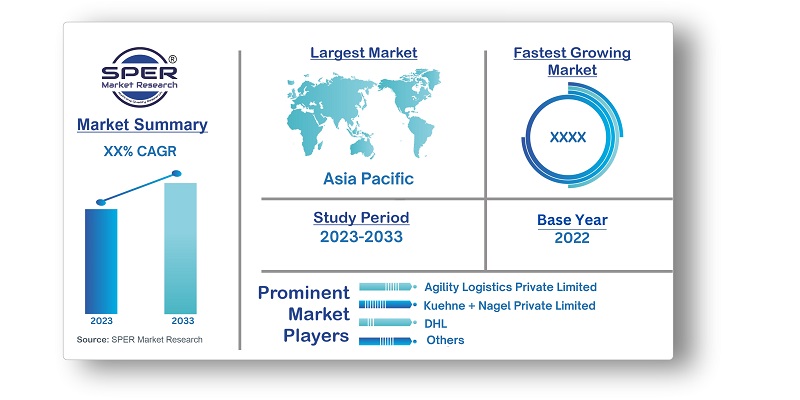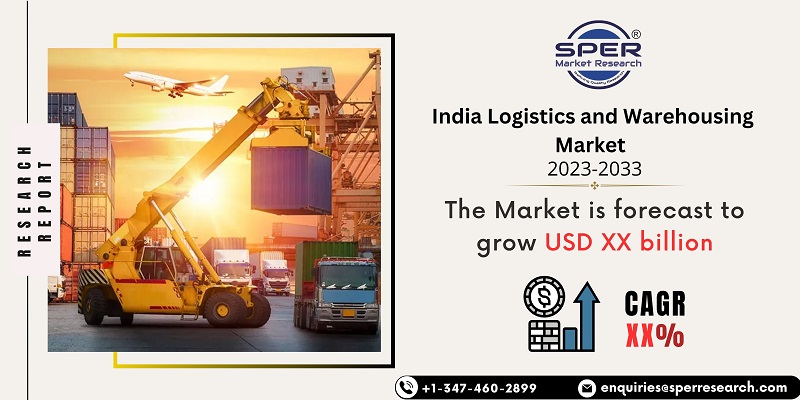
India Logistics and Warehousing Market Growth, Share, Trends, Revenue and Future Scope 2023
India Logistics and Warehousing Market Size- By Model Type, By Transportation Model, By End Use- Regional Outlook, Competitive Strategies and Segment Forecast to 2032
| Published: Feb-2023 | Report ID: AMIN2341 | Pages: 1 - 103 | Formats*: |
| Category : Automotive & Transportation | |||
- E-commerce Boom: The rapid growth of India's e-commerce sector has been a major driver for the logistics and storage market. With the growing popularity of online shopping, there has been a surge in demand for efficient and dependable logistics services to ensure timely and cost-effective product delivery.
- Infrastructure Development: The Indian government has made major investments in infrastructure development, including the construction of motorways, expressways, ports, airports, and dedicated freight corridors. These infrastructure upgrades have improved connectivity, cut transportation costs, and increased the overall efficiency of logistics and storage operations.


| Report Metric | Details |
| Market size available for years | 2019-2033 |
| Base year considered | 2022 |
| Forecast period | 2023-2033 |
| Segments covered | By Model Type, By Transportation Model, By End Use |
| Regions covered | East India, North India, South India, West and Central India. |
| Companies Covered | Agility Logistics Private Limited, DHL, Expeditors International (India) Private Limited, Fedex Trade Networks Transport and Brokerage Private Limited, Kuehne + Nagel Private Limited. |
- Retailers and E-Commerce Companies
- Importers and Exporters
- Third-party Logistics
- Transporters and Freight Forwarders
| By Model Type: |
|
| By Transportation Model: |
|
| By End Use: |
|
- India Logistics and Warehousing Market Size (FY’2022-FY’2032)
- Overview of India Logistics and Warehousing Market
- Segmentation of India Logistics Market By Model Type (2 PL, 3 PL, 4 PL)
- Segmentation of India Logistics Market By Transportation Model (Airways, Railways, Roadways, Seaways)
- Segmentation of India Logistics Market By End Use (Automotive, Chemicals, Construction, Consumer Goods, Food and Beverages, Healthcare, IT Hardware, Manufacturing, Oil and Gas, Retail, Telecom, Others)
- Statistical Snap of India Logistics and Warehousing Market
- Expansion Analysis of India Logistics and Warehousing Market
- Problems and Obstacles in India Logistics and Warehousing Market
- Competitive Landscape in the India Logistics and Warehousing Market
- Impact of COVID-19 and Demonetization on India Logistics and Warehousing Market
- Details on Current Investment in India Logistics and Warehousing Market
- Competitive Analysis of India Logistics and Warehousing Market
- Prominent Players in the India Logistics and Warehousing Market
- SWOT Analysis of India Logistics and Warehousing Market
- India Logistics and Warehousing Market Future Outlook and Projections (FY’2022-FY’2032)
- Recommendations from Analyst
1.1. Scope of the report1.2. Market segment analysis
2.1 Research data source2.1.1 Secondary data2.1.2 Primary data2.1.3 SPER’s internal database2.1.4 Premium insight from KOL’s2.2 Market size estimation2.2.1 Top-down and Bottom-up approach2.3 Data triangulation
4.1. Driver, Restraint, Opportunity and Challenges analysis4.1.1 Drivers4.1.2 Restraints4.1.3 Opportunities4.1.4 Challenges4.2. COVID-19 Impacts of the India Logistics Market
5.1. SWOT analysis5.1.1 Strengths5.1.2 Weaknesses5.1.3 Opportunities5.1.4 Threats5.2. PESTEL analysis5.2.1 Political landscape5.2.2 Economic landscape5.2.3 Social landscape5.2.4 Technological landscape5.2.5 Environmental landscape5.2.6 Legal landscape5.3. PORTER’S five forces analysis5.3.1 Bargaining power of suppliers5.3.2 Bargaining power of Buyers5.3.3 Threat of Substitute5.3.4 Threat of new entrant5.3.5 Competitive rivalry5.4. Heat map analysis
6.1 India Logistics Market Manufacturing Base Distribution, Sales Area, Product Type6.2 Mergers & Acquisitions, Partnerships, Product Launch, and Collaboration in India Logistics Market
7.1 2 PL7.2 3 PL7.3 4 PL
8.1 Airways8.2 Railways8.3 Roadways8.4 Seaways
9.1 Automotive9.2 Chemicals9.3 Construction9.4 Consumer Goods9.5 Food and Beverages9.6 Healthcare9.7 IT Hardware9.8 Manufacturing9.9 Oil and Gas9.10 Retail9.11 Telecom9.12 Others
10.1 India Logistics Size and Market Share by Region (2019-2025)10.2 India Logistics Size and Market Share by Region (2026-2032)10.3 North India10.4 West and Central India10.5 South India10.6 East India
11.1 Agility Logistics Private Limited11.1.1 Company details11.1.2 Financial outlook11.1.3 Product summary11.1.4 Recent developments11.2 DHL11.2.1 Company details11.2.2 Financial outlook11.2.3 Product summary11.2.4 Recent developments11.3 Expeditors International (India) Private Limited11.3.1 Company details11.3.2 Financial outlook11.3.3 Product summary11.3.4 Recent developments11.4 Fedex Trade Networks Transport and Brokerage Private Limited11.4.1 Company details11.4.2 Financial outlook11.4.3 Product summary11.4.4 Recent developments11.5 Kuehne + Nagel Private Limited11.5.1 Company details11.5.2 Financial outlook11.5.3 Product summary11.5.4 Recent developments
SPER Market Research’s methodology uses great emphasis on primary research to ensure that the market intelligence insights are up to date, reliable and accurate. Primary interviews are done with players involved in each phase of a supply chain to analyze the market forecasting. The secondary research method is used to help you fully understand how the future markets and the spending patterns look likes.
The report is based on in-depth qualitative and quantitative analysis of the Product Market. The quantitative analysis involves the application of various projection and sampling techniques. The qualitative analysis involves primary interviews, surveys, and vendor briefings. The data gathered as a result of these processes are validated through experts opinion. Our research methodology entails an ideal mixture of primary and secondary initiatives.



Frequently Asked Questions About This Report
PLACE AN ORDER
Year End Discount
Sample Report
Pre-Purchase Inquiry
NEED CUSTOMIZATION?
Request CustomizationCALL OR EMAIL US
100% Secure Payment






Related Reports
Our Global Clients
Our data-driven insights have influenced the strategy of 200+ reputed companies across the globe.






















